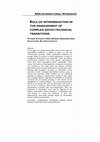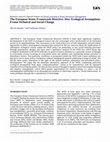Papers by Patrick Steyaert

In this paper, we analyze intermediary work in the context of sustainability transitions in relat... more In this paper, we analyze intermediary work in the context of sustainability transitions in relation to what we call the “environmental paradox”. While sustainability transitions are strongly related to political or social expectations in terms of management performance and measurable results and effects, environmental problems have some generic characteristics which make these expectations partly unachievable. Those recover the notions of interdependency, complexity, uncertainty and controversy. We argue those key features condition understanding and concrete achievement of intermediary work. Drawing upon biographic narratives of intermediary actors (extension worker, mandated intermediary workers, group of experts and researcher, NGO member), we use contrasting examples to propose a comprehensive reading of what makes their strategies effective regarding the development of political narratives and of learning processes in the context of the management of ‘wicked problems’. Our cro...

The European Water Framework Directive (WFD) is built upon significant cognitive developments in ... more The European Water Framework Directive (WFD) is built upon significant cognitive developments in the field of ecological science but also encourages active involvement of all interested parties in its implementation. The coexistence in the same policy text of both substantive and procedural approaches to policy development stimulated this research as did our concerns about the implications of substantive ecological visions within the WFD policy for promoting, or not, social learning processes through participatory designs. We have used a qualitative analysis of the WFD text which shows the ecological dimension of the WFD dedicates its quasi-exclusive attention to a particular current of thought in ecosystems science focusing on ecosystems status and stability and considering human activities as disturbance factors. This particular worldview is juxtaposed within the WFD with a more utilitarian one that gives rise to many policy exemptions without changing the general underlying ecological model. We discuss these policy statements in the light of the tension between substantive and procedural policy developments. We argue that the dominant substantive approach of the WFD, comprising particular ecological assumptions built upon "compositionalism," seems to be contradictory with its espoused intention of involving the public. We discuss that current of thought in regard to more functionalist thinking and adaptive management, which offers greater opportunities for social learning, i.e., place a set of interdependent stakeholders in an intersubjective position in which they operate a "social construction" of water problems through the co-production of knowledge.
Ecology and Society, Jan 1, 2007
Lecture Notes in Business Information Processing, 2009
Determining the features that should and those that should not be in your next product release is... more Determining the features that should and those that should not be in your next product release is riddled with ambiguity, uncertainty and value conflict. Prioritising the product backlog according to business value is not easy when everyone has a different understanding of the meaning of value and everyone estimates the business value of a particular feature differently.

Lecture Notes in Computer Science, 1994
OPUS is an elementary calculus that models object-orientation. It expresses in a direct way the c... more OPUS is an elementary calculus that models object-orientation. It expresses in a direct way the crucial features of object-oriented programming such as objects, encapsulation, message passing and incremental modification. This is illustrated by numerous examples. Thanks to the way objects are constructed in this calculus, we can deal with selfreference, recursion and even mutual recursion in a straightforward way. We also illustrate that it is relatively easy to model different kinds of inheritance mechanisms. Finally, we argue to which extent our calculus can be used for modeling and investigating object-oriented concepts. POINT := [ getx#x, gety#y, set#< self / [self=self,class=class,x=x,y=y] >, move#( <self/[self=self,class=class]> set:[x=x,y=y] ) ] MODIFIER := [ set#< x ≤ 5 / [ then=<self/[self=self,class=class,x=x,y=y]>, else=error ] > if ] BOUNDEDPOINT := (POINT + MODIFIER)
In this position paper, we present some problems we face in the development of an integrated soft... more In this position paper, we present some problems we face in the development of an integrated software application for broadcast planning. Concretely, we'll discuss customization and authorization. Our current implementation of both issues suffers from heavy cross-cutting and code- tangling. Therefore we would like to present these problems at the ECOOP 2000 workshop on aspect-oriented programming to deepen our understanding

The European Water Framework Directive (WFD) is built upon significant cognitive developments in ... more The European Water Framework Directive (WFD) is built upon significant cognitive developments in the field of ecological science but also encourages active involvement of all interested parties in its implementation. The coexistence in the same policy text of both substantive and procedural approaches to policy development stimulated this research as did our concerns about the implications of substantive ecological visions within the WFD policy for promoting, or not, social learning processes through participatory designs. We have used a qualitative analysis of the WFD text which shows the ecological dimension of the WFD dedicates its quasi-exclusive attention to a particular current of thought in ecosystems science focusing on ecosystems status and stability and considering human activities as disturbance factors. This particular worldview is juxtaposed within the WFD with a more utilitarian one that gives rise to many policy exemptions without changing the general underlying ecolo...
Proceedings of the 1994 Joint Modular Languages …, 1994
... Carine Lucas, Patrick Steyaert Programming Technology Lab Computer Science Department Vrije U... more ... Carine Lucas, Patrick Steyaert Programming Technology Lab Computer Science Department Vrije Universiteit Brussel Pleinlaan 2, B-1050 Brussels BELGIUM email: {clucas ... LA Stein, H. Lieberman and D. Ungar: A Shared View of Sharing: The Treaty of Orlando In Object ...
Since the early eighties, object-oriented frameworks have demonstrated that one can encapsulate a... more Since the early eighties, object-oriented frameworks have demonstrated that one can encapsulate a reusable, tailorable software architecture as a collection of col- laborating, extensible object classes. Such frameworks are particularly important for the development of open systems, where not only functionality, but also architecture must be reused across a family of related applications. Unfortunately, the design of frameworks remains an
Since the early 1980s, object-oriented frameworks have demonstrated that programmers can encapsul... more Since the early 1980s, object-oriented frameworks have demonstrated that programmers can encapsulate a reusable, tailorable software architecture as a collection of collaborating, exten- sible object classes. Such frameworks are particularly important for developing open systems in which not only functionality but architecture is reused across a family of related applications. Unfortunately, the design of frameworks remains an art rather than
Lecture Notes in Computer Science, 1999
UML provides little support for modelling reusable specifications and designs. To deal with this ... more UML provides little support for modelling reusable specifications and designs. To deal with this problem, we enhance UML with support for reuse and evolution of model components (more specifically, collaborating classes). To this extent, we enhance the UML (meta-) model with the "reuse contract" formalism. Among others, this gives us a formal semantics for reuse that allows us to detect reuse and composition conflicts automatically.
Lecture Notes in Computer Science, 1995
A Marriage of Class-and Object-Based Inheritance Without Unwanted Children Patrick Steyaert Wolfg... more A Marriage of Class-and Object-Based Inheritance Without Unwanted Children Patrick Steyaert Wolfgang De Meuter Vrije Universiteit Brüssel Programming ... Hence, conventional generators and fixed points will not do the job properly as objects need an unfixed rather than a ...
ACM SIGPLAN Notices, 1994
Agora is a framework for exploring object-oriented languages. In this paper we will discuss a par... more Agora is a framework for exploring object-oriented languages. In this paper we will discuss a particular prototype-based instance of Agora that features a general mixin-based approach to (multiple) inheritance. One of the major innovations of Agora is that many important features of object-orientation including inheritance, slot access, reification, cloning and inline objects are introduced by means of message passing rather
OOIS’94, 1995
We propose a very concise calculus for modelling object-oriented concepts such as objects, messag... more We propose a very concise calculus for modelling object-oriented concepts such as objects, message sending, encapsulation and incremental modification. We show how to deal with recursion and provide some object-oriented examples. State and encapsulated inheritance are modelled by means of an incremental modification operator.





Uploads
Papers by Patrick Steyaert